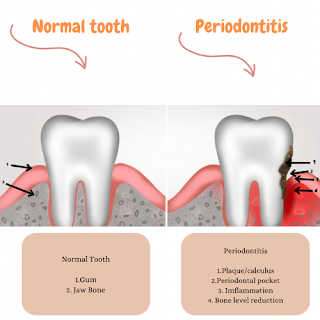~ Benefits of Vitamin D for Dental Health ~ / Fatricia Yonvi’e Ariska_221051033_KesehatanGigi1A
~ Benefits of Vitamin D for Dental Health ~
Vitamin D ? Maybe many people think that in maintaining dental health it is enough to brush your teeth regularly. In fact, not only that, nutritional needs must also be met, for example calcium. One of the main functions of calcium is to support the formation of strong teeth. Even from the amount of calcium in the body, about 90 percent is stored in the teeth.This mineral is needed to form tissues in teeth such as enamel (enamel), dentin, and also tooth cementum. If the teeth don't get enough calcium, tissue formation will be disrupted and cause problems with the strength of the teeth themselves.Vitamin D is a fat-soluble vitamin that helps the body absorb calcium. Adequate vitamin D intake can prevent dental and oral problems. Adequate intake can avoid dental and oral problems.
Some of the benefits of vitamin D for oral health:
1. Facilitate Calcium Absorption
The benefits of sufficient vitamin D in the body are very useful for forming cortisol compounds. This compound will be used by the body to optimize the absorption of calcium. If calcium needs are met, then the problem of cavities, swollen gums, and so on can be prevented.
2. Prevents Tooth Decay
Vitamin D is very important to help absorb and retain calcium and phosphorus for the process of mineralizing teeth and bones. However, teeth may weaken when the body has low levels of vitamin D.
These conditions make you very susceptible to broken bones, cavities, and tooth decay. A study shows that lower levels of vitamin D can cause dental caries.
3. Periodontitis
According to the Journal of Periodontal Research, lower levels of vitamin D may increase the risk of periodontitis. This is because vitamin D has a connection with the immune system. This vitamin has a positive impact on inflammation and tooth mineralization effects on the tissues near the teeth.
- Vitamins produce cathelicidins and defensins which have antimicrobial properties. These compounds reduce the number of bacteria in the mouth.- Reducing matrix metalloproteinase (MMP), an enzyme associated with periodontitis. There is evidence showing that MMP is increasing in the oral cavity, it is associated with dental caries and oral cancer.
Vitamin D is a vitamin that plays a major role in maintaining healthy teeth and mouth. To get the maximum benefits of vitamin D for your teeth and mouth, make sure to meet your daily vitamin D needs by preventing every morning and eating foods rich in vitamin D. Don't forget to brush your teeth diligently and maintain healthy teeth and have a dental health check every 6 months very.
As mentioned above, vitamin D also plays a role in regulating the immune system. The mouth is a soft nest for germs and bacteria that can cause disease. If your intake of vitamin D is sufficient, this will further strengthen your immune system in fighting various diseases related to teeth and mouth. Not only that. Without sufficient vitamin D, your body also cannot form sufficient calcitriol compounds to absorb calcium from food. This means that your risk of having dental problems, especially cavities and gum disease, can increase. What's more, the genes that control periodontitis (gum disease) are also regulated by receptors that are controlled by vitamin D.
💊
Vitamin D can be obtained from?
Vitamin D is a fat-soluble vitamin that helps the body absorb calcium. Adequate vitamin D intake can prevent dental and oral problems. Adequate intake can avoid dental and oral problems.
Some of the benefits of vitamin D for oral health:
The benefits of sufficient vitamin D in the body are very useful for forming cortisol compounds. This compound will be used by the body to optimize the absorption of calcium. If calcium needs are met, then the problem of cavities, swollen gums, and so on can be prevented.
Vitamin D is very important to help absorb and retain calcium and phosphorus for the process of mineralizing teeth and bones. However, teeth may weaken when the body has low levels of vitamin D.
These conditions make you very susceptible to broken bones, cavities, and tooth decay. A study shows that lower levels of vitamin D can cause dental caries.











Komentar
Posting Komentar